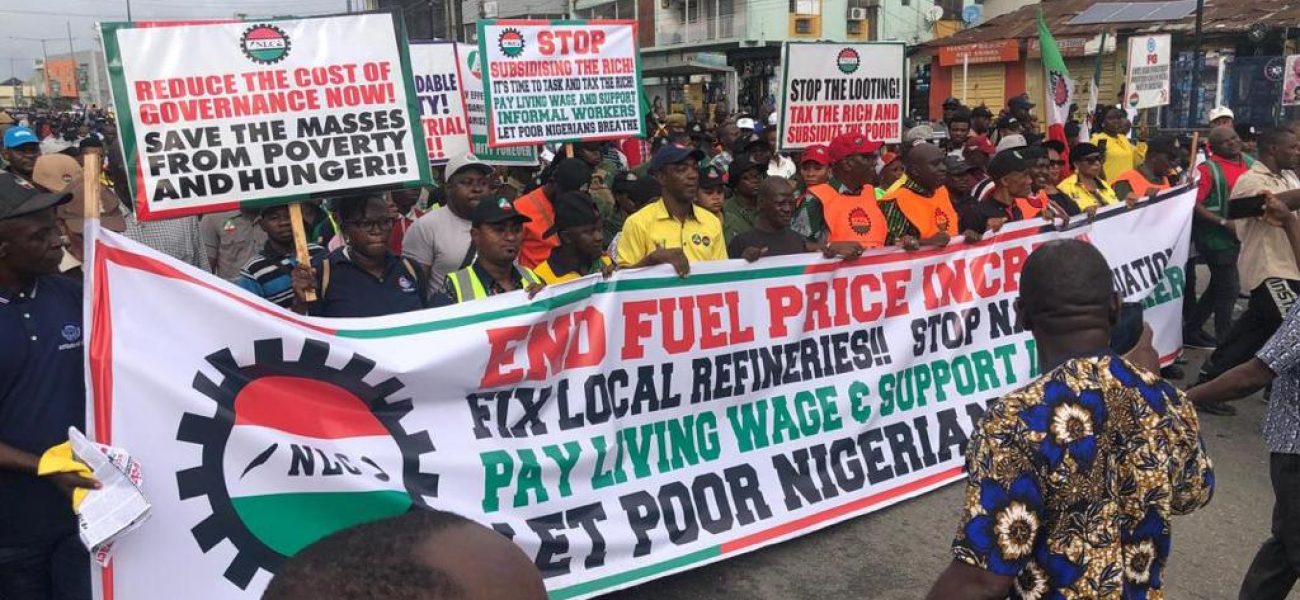In less than 24 hours after kicking off a nationwide protest, the Nigeria Labour Congress (NLC) and Trade Union Congress (TUC) have suspended the protest and proposed strike action. The labour unions on August 2, 2023, made good on their plan to commence a strike action beginning with a nationwide protest to call for the reversal of some of the Federal Government’s policies which have occasioned hardship for citizens. Members of the unions marched out in protest in different States across the Federation, bearing placards calling for a stop to the devaluation of the naira, fuel price increase, among other issues. In the capital city of Abuja, protesters marched to the National Assembly, where the gate was eventually brought down, allowing them entrance into the Assembly complex, after security operatives declined them access.
The nationwide protest came despite the Federal Government’s efforts to put a stop to it, a motion by the Senate calling for a halt to it and a court order restraining the NLC from embarking on strike. The union stood its ground on the protest even after President Bola Tinubu’s nationwide broadcast on July 31, wherein he revealed measures that his administration will undertake to ameliorate the burden of Nigeria’s current economic situation on citizens. The labour unions described the palliatives as insignificant to address the high level of suffering that citizens are experiencing at this time. However, the protest has been suspended barely a day after it began, to give the Federal Government time to implement its plans to address the harsh living conditions.
Like many countries in the world, Nigeria has been grappling with economic challenges. However, in recent months, the challenges have been worsened by the removal of petrol subsidy and the unification of foreign exchange rates.
According to President Tinubu in his July 31 broadcast, petrol subsidy outlived its usefulness and had to go. He described the multiple exchange rates system as a highway of currency speculation and a conduit through which national wealth was used to enrich a select few. He noted that the scrapping of subsidy and multiple exchange rates are key to long-term economic reform. To address the immediate adverse impact of this action, the President stated that his administration will be employing measures such as disbursing loans to manufacturing enterprises and other businesses at an interest rate of 9% per annum, investment in the agricultural sector to ensure availability of food at affordable prices, an Infrastructure Support Fund for States to revamp critical infrastructure and a review of the minimum wage. He also stated that his administration was observing the impact of the exchange rate and inflation on petrol price and will intervene, if and when necessary. Noting the gap between the petrol subsidy removal and the unveiling of the government’s plans to address the immediate impact on citizens, President Tinubu urged Nigerians to have faith in his administration’s ability to deliver on these plans.
In response to the nationwide protests by labour unions, the President in a statement by his Special Adviser on Special Duties, Communications and Strategy, Dele Alake, has now made a further commitment to labour leaders, that the Port Harcourt refineries will commence production by December 2023.
While there may be no doubt as to the potential of the subsidy removal and exchange rate unification to improve Nigeria’s economy in the long run, what is unclear is how much time this will take and how much longer Nigerians can bear the soaring cost of living and diminished purchasing power. Indeed, the government has reeled out palliative measures but implementation and sustainability of these measures remain to be seen.

